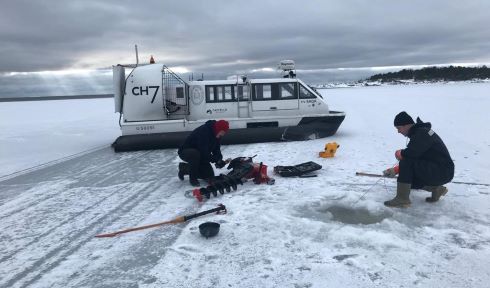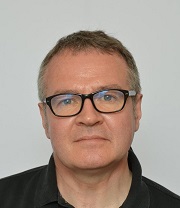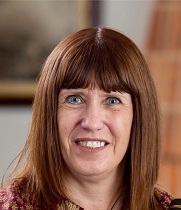Member profiles
Our latest profiles explore the working lives of Dr David N Thomas FRSB, a professor of Artic ecosystems; science technician Laurence Dawkins-Hall FRSB; and RSB trustee Dr Jacqui Piner FRSB
These profiles appeared in the Winter 2022 issue of The Biologist (Vol 69 No 4)
A Day in the Life: David N Thomas FRSB on the joys and challenges of studying sea ice

David Thomas is professor of Arctic ecosystems research at the University of Helsinki, Finland. In 2021 an Antarctic glacier was named after him in recognition of his Antarctic research, and this year he was awarded the Polar Medal in recognition of his work at both poles.
My alarm goes off… at around 7:00 and it’s a quick shower, followed by a few quiet contemplative moments down at the boat jetty. I’ve been coming to the Tvärminne field station of the University of Helsinki in south-west Finland since 1986, when I was doing a PhD at Liverpool University. I always try to get a few moments to stand and stare at the familiar but always changing seascape, or in this case icescape. Back home in Helsinki my day starts with a 40- to 50-minute bike commute where I try to do the same thing.
After breakfast…we head off onto the ice. This can be on foot, on a skidoo or here in Tvärminne we are privileged to have access to a hovercraft to transfer us to field stations a little way from the coast. We collect ice samples using an ice corer and by sawing the retrieved ice core into sections. These are then melted and the chemistry and biology within investigated. Often in the field we have to pull all our sampling gear and coring equipment behind us on sleds, so to have the hovercraft is a huge bonus.
Most of the morning…is generally spent in the field, and then it is back to the field station for lunch and to process samples. This is just a three-day trip. When we go to the Arctic or Antarctic ice-covered oceans on board research vessels the routine is much the same, but my trips can be between 55 and 75 days long. We are deployed from the ship, sometimes in a helicopter, work on the ice for several hours to collect measurements and samples, and then return to the ship to process data and samples.
Evenings are spent…around dinner, talking, planning future campaigns, catching up with emails and talking with home. The latter is not such a big deal on a trip lasting three to four days, but on the longer Arctic and Antarctic trips they are very profound parts of the day – especially if I’m away during family birthdays or Christmas.
The Career Ladder: Laurence Dawkins-Hall FRSB on supporting fellow science technicians to have fulfilling careers

I first discovered biology…in a serious manner in my mid-teens when I read the seminal book Life on Earth by Sir David Attenborough Hon FRSB. I then went on to study an undergraduate degree in biomedical sciences.
A pivotal point in my career was…becoming a chartered scientist (CSci) with the Science Council, which opened up my outreach work. In truth, since that time (around 2017) I have never looked back.
A key piece of advice would be…decide early in your scientific career if you are technically focused or academically inclined. If you think you’re the former, you might find industry is a better fit; if you’re leaning to the latter, then think seriously about pursuing a PhD.
I also…commit some of my time to supporting the Technician Commitment (with official support of Life Sciences at the University of Leicester), both in-house at Leicester and also on a national platform in association with the Science Council, the Institute of Science and Technology, the National Technician Development Centre and the RSB.
In the future I hope to…pursue and expand my outreach work, as well as continue to support teaching classes at the University of Leicester. I also love to write about science and technical careers, which I hope to continue via freelance writing. I might even start tutoring for GCSE and A level biology and chemistry, which would (finally) put my earlier teacher training to good use!
My Society and me: Dr Jacqui Piner FRSB on professional recognition through the RSB

The value of learned society membership for biologists working in industry may not be immediately obvious, but I’ve found many excellent benefits. My career was devoted to developing new medicines where results were described in documents for regulators and clinical trial professionals but not necessarily for publication in journals. Membership of the Society is a means of demonstrating my commitment to the biosciences.
Having recently retired from full-time employment, I greatly value staying up to date via newsletters, articles in The Biologist and attendance at a range of events. Biology is a collaborative science and membership provides extensive networks across the diversity of the biosciences. I also highly recommend getting involved with your local branch – it’s a great way to meet people while having fun learning about new aspects of biology. It’s also an opportunity to develop useful transferable skills.
Finally, RSB membership is an excellent avenue to “give something back” to the profession. I was honoured to be elected as a trustee and Council member and am keen to help further integrate equality, diversity and inclusion strategies throughout RSB culture and its activities.


